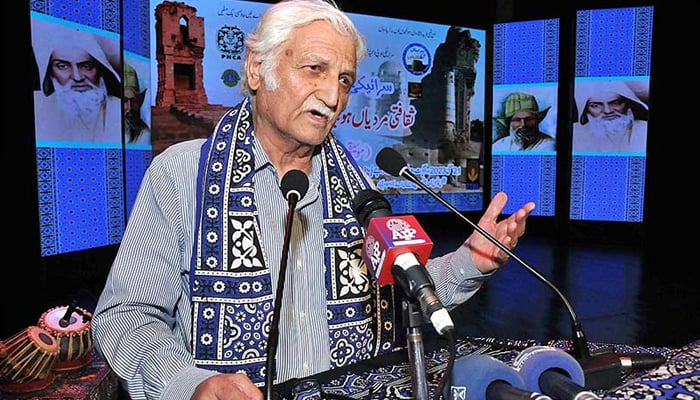Farhatullah Babar for end to digital gap to address inequality
ISLAMABAD: President Pakistan People’s Party (PPP) Human Rights Cell and Former Senator Farhatullah Babar said women, students, minorities, disabled and transgender are the most handicapped in accessing information in digital spaces resulting in their disempowerment and there is a need to bridge the divide.
“There is also a need for ending digital manipulation to ensure free and fair elections,” he said at a seminar on ‘Digital Divide’ in Islamabad Friday.
Farhatullah Babar said: “In any discussion on the digital divide it is important to discuss digital manipulation of elections through fake news in mind in this election season. The fake news through social media was employed in the United States Presidential elections in 2016 as well as in the Brexit referendum. On the surface, those involved in manipulations are political parties, extremist groups, and media organizations but invisible elements also have played a role.”
Babar said the Supreme Court in its verdict in the Faizabad dharna case has called it ‘nebulous tactics’ by state agencies. “The various video leaks of all types are also information manipulation,” he added.
He also recalled how in 2010 fake Wikileaks were published by the mainstream media eulogizing Pakistan’s security establishment and demonizing others. “The media then had to apologize for falling prey to fake news”.
He said: “Three power centres control information namely government media, private media and the invisible ones behind the ‘nebulous tactics. The Election Commission should devise a code against the manipulation of digital spaces to achieve ‘positive’ results. The proposed code must be based on access, affordability, skills and awareness about digital spaces as creators of wealth, education and opportunities. Information is power and access to it by all is a power multiplier and vital for inclusion.”
He said that the digital landscape was heavily tilted against the students of remote areas in merged districts of Pakhtunkhwa, Gilgit-Baltistan and Balochistan who are fast losing learning opportunities not only due to poor internet access but also due to whimsical internet shutdowns.
Farhatulah Babar said a security-driven state does not recognize access to information as a fundamental right. “The security establishment refuses to answer questions asked under RTI even while the Supreme Court has started answering such questions. Digital inclusion means that no one remains offline but students and women mostly remain offline.”
About the reasons for the marginalization of women in digital spaces, he cited lack of access to technology, political & economic disempowerment, poor education, societal norms, early marriages, and above all gender-based harassment as reasons.
He said only 18% of women in Pakistan have bank accounts as against 51 % of men. “Only 50% of women have mobile phones as opposed to 81% of men. Only 19% of women as opposed to 38% of men used the internet in Pakistan,” he said.
Commenting on “Prevention of Electronic Crimes Act (PECA) 2016”, he said: “PECA has increased restrictions on access to information and needs to be reviewed. Journalists and activists have been charged under PECA for “anti-state” speech, leading to a vague summons, FIRs in non-bailable offences, threat of raids, and prolonged trial periods. The absence of a Data Protection law has exposed citizens to the misuse of PECA.”
Babar highlighted that high courts usually avoid interference with investigations, but coercion of citizens often occurs during such stage.
-
 Cure Flu With Theses Two Golden Foods
Cure Flu With Theses Two Golden Foods -
 King Charles Delayed Taking Firm Stance Against Andrew But William Pushed Action
King Charles Delayed Taking Firm Stance Against Andrew But William Pushed Action -
 Toronto Blue Jays Roster Faces Setback With Multiple Injury Concerns
Toronto Blue Jays Roster Faces Setback With Multiple Injury Concerns -
 Demi Lovato Leaves Fans Disappointed With Unexpected Announcement
Demi Lovato Leaves Fans Disappointed With Unexpected Announcement -
 Pacers Vs Knicks Overtime Thriller Ends In Heartbreak For New York
Pacers Vs Knicks Overtime Thriller Ends In Heartbreak For New York -
 Who Owns The Ambassador Bridge? New Report Links Owner Matthew Moroun To Trump’s Threat
Who Owns The Ambassador Bridge? New Report Links Owner Matthew Moroun To Trump’s Threat -
 ICE Detention Center Plan Sparks Controversy In Maryland As Lawmakers Push Back
ICE Detention Center Plan Sparks Controversy In Maryland As Lawmakers Push Back -
 Blood Pressure Medication Recalled After Wrong Tablets Found In Bottles
Blood Pressure Medication Recalled After Wrong Tablets Found In Bottles -
 Why Ariana Grande Wants A 'tiny Mouse' To Play Her In Biopic?
Why Ariana Grande Wants A 'tiny Mouse' To Play Her In Biopic? -
 Wind Chill Returns With Brutal Cold As Polar Vortex Stalls Over Canada
Wind Chill Returns With Brutal Cold As Polar Vortex Stalls Over Canada -
 Princess Beatrice, Eugenie ‘do Not Want To Be Seen In Public’ Because Of Dad
Princess Beatrice, Eugenie ‘do Not Want To Be Seen In Public’ Because Of Dad -
 Costco $20 Rule Explained As Employee Pay Climbs Across North America
Costco $20 Rule Explained As Employee Pay Climbs Across North America -
 Strange Incident Happened At Nancy Guthrie's Home On Abduction's 10th Day
Strange Incident Happened At Nancy Guthrie's Home On Abduction's 10th Day -
 Tumbler Ridge School Lockdown Underway As RCMP Investigate School Shooting
Tumbler Ridge School Lockdown Underway As RCMP Investigate School Shooting -
 Royal Family Knows There Can Be ‘no More Glossing’ Of Andrew Downfall
Royal Family Knows There Can Be ‘no More Glossing’ Of Andrew Downfall -
 Britney Spears Quietly Parts Ways With Her Music Catalog: Report
Britney Spears Quietly Parts Ways With Her Music Catalog: Report




